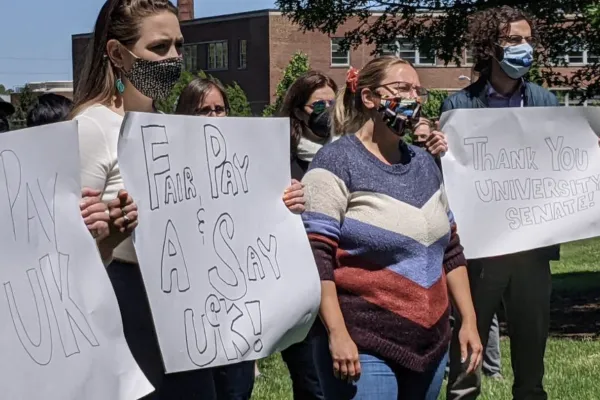U of L clarifies remote work policy, after pressure from union
This article was originally published by WFPL on January 26th, 2022.
University of Louisville administration has sent a statement to faculty and staff clarifying its position on remote work options, following calls for the school to allow more flexibility during COVID-19 surges.
The letter sent Tuesday outlines temporary remote work options that can be used with permission of a supervisor or department head and includes an updated Emergency Temporary Leave Guidelines policy.
“After discussions with Faculty and Staff Senate leadership, we want to clarify the university’s position on flexible scheduling,” the letter reads, in part. “Since the beginning of our COVID-19 response, we have asked faculty and staff to be flexible with students who are complying with our health and safety protocols by staying home when experiencing symptoms, in quarantine or in isolation.”
Nathan Schimpf, a graduate assistant and organizer of the Louisville chapter of United Campus Workers, believes the statement is in response to activism by students, staff and faculty over the past three weeks.
“I do think it’s a result of our actions,” Schimpf said. “I don’t think we would have been able to get these sort of assurances that the university is willing to protect faculty and staff had we not spoken up.”
Schimpf and others were concerned after the administration announced days before the start of the semester that classes would resume in-person amid the most infectious period of the COVID-19 pandemic to date.
More than 1,400 students, faculty and staff signed a petition delivered earlier this month to Interim President Lori Gonzalez, after the semester started in-person amid the omicron surge.
Last week, around 30 students rallied on campus and attended the university board of trustees meeting to make their concerns heard.
U of L administration called the letter a clarification. Schimpf said the information would have been useful at the start of the semester.
“It looks like they didn’t want to make this policy clear initially, even though we were going into a surge and it would have been beneficial at that time,” Schimpf said.
“They didn’t want to clarify it initially and because of all this public pressure, they had to.”
It’s time the University of Kentucky paid student workers what they’re worth | Opinion

